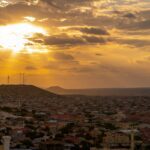While visiting the Silk Roads exhibit at the British Museum, a seemingly minor detail caught my eye. On one of the plaques about Tibet, the word “Xizang” was also used. Most visitors would likely not even have noticed, but I recognized the inclusion of that word as a deeply political and controversial choice.
I had first learned of the concerted Chinese campaign to start replacing “Tibet” with the word “Xizang” — the pinyin romanization of the Mandarin word for Tibet — last year, during research for a story on Dr. Gyal Lo, a scholar and expert on the colonial-style Tibetan boarding schools. During our interview, I asked him about a video I had seen circulating on social media that said there was now a governmental push to refer to Tibet as “Xizang.” “Officially, they announced this publicly on August 14, 2023 when they hosted the International Seminar on Tibetan Studies in Beijing,” he explained. The stated goal of that event was to reshape perceptions of Tibet globally.
I asked Gyal Lo why he believes these changes are happening now. “It’s a good question,” he responded. “You have to understand the broader context.” He said that previously, China lacked the confidence it now has as the world’s second-largest economy. “Now they want to call it Xizang to show even more strongly that Tibet belongs to China. The push to use Xizang is a huge signal from China’s side to show that Tibet is fully under their control.”
Crucially, Gyal Lo noted that the Chinese Communist Party (CCP) is not only advocating for the replacement of the word Tibet amongst Chinese, but also the world at large. “Not only do they want to use it in China, but they also want the international community to follow suit and start using the term Xizang.” It appears that now this strategy is beginning to take effect.
What’s In a Name?
Gyal Lo was clearly alarmed about this development, remarking, “The word Tibet has a long history of over 200 years — way before the Chinese Communist Party took power in 1949. They are playing a game of words, and it won’t work.” However, he also acknowledged concerns. “At the same time, I’m a bit worried about this, because if other countries have a good relationship with China, then their media will follow what China says. They’re going to say ‘Xizang’ instead of ‘Tibet.’ I hope they won’t do that.”
“There is no more Tibet in the official documents of the Chinese Ministry of Foreign Affairs.”
United Front Work Department
Gyal Lo made a point to clarify that when he and other Tibetan advocates talk about Tibet, they are referring to the entire Tibetan region, including the Tibet Autonomous Region (TAR), the ten Tibetan autonomous prefectures, and the two Tibetan autonomous counties. This encompasses parts of provinces like Qinghai, Sichuan, Gansu, and Yunnan. “What China tries to do is to use the term ‘Tibet’ to only refer to the TAR. So now China is using Xizang to only refer to TAR.”
One of the individuals that uses the wider definition of Tibet is the Dalai Lama. China’s fear of the charismatic spiritual leader’s political power has also contributed to the CCP’s desire to redefine Tibet. The United Front Work Department (UFWD) — a CCP organization responsible for building influence and managing relations with individuals and groups domestically and internationally to advance party goals — stated on its official WeChat account that the word “Tibet” was misleading, as it granted the community, some of whom advocate for independence and their own state, wider geographic scope. As far back as 2014, Chinese officials expressed worry that the usage of that term could benefit the exiled leader.
Since 2019, Chinese state media outlets have been using Xizang rather than Tibet, and in 2023, the UFWD’s official news account declared that Tibet is no longer used in the Ministry of Foreign Affairs’ official papers. Pointing to the greater intentions behind the renomination, the UWFD account declared: “There is no more Tibet in the official documents of the Chinese Ministry of Foreign Affairs.”
As director of the Tibet Policy Institute Dawa Tsering remarked, “The most important thing is not what China does. It’s about whether the international community will buy it.”
Museums as Sites of Contention
The British Museum is not the only Western cultural institution to have used the term. Two museums in France faced controversy for replacing the word “Tibet” with “Xizang,” prompting local protests in Paris, a message in response from the president of the Tibetan government-in-exile to the French government, and ultimately resulting in a change in practice and an apology by one of the museums.
That institute was the Musée du Quai Branly, whose spokesperson said that the museum had been using the word “Xizang” before the China’s formalization of it last year, and that “It has never been used on its own and a mention of Tibet has always been present….[But] Tibet will no longer be in brackets, and the Xizang name will soon be removed.”
At the British Museum, both words were used alongside each other. Yet, Tibetan activists in London, like Tsering Passang, argue that the move is not objective. “The choice of terminology here is far from neutral; it is a political stance that dismisses the unique identity of Tibet and subtly reinforces China’s contested claim to Tibet as an inherent part of its territory.” Pointing to the efforts of initiatives like the Xizang International Communication Centre, he is concerned about how far Europe’s cultural institutions “are willing to bend to political pressure.”
Tsering Passang’s organization, the Global Alliance for Tibet and Persecuted Minorities, received a letter from the British Museum, which stated that it did not intend to substitute “Xizang” for “Tibet” in the labels. The activists did not find this to be satisfactory in addressing the concerns they had raised. For the activists, it is the very inclusion of the word itself that is provocative. The British Museum did not respond when I approached them for comment on this matter.
This case brings up broader questions about the ethical practices of museums, and underscores their importance as guardians of historical narratives, highlighting their inherently political roles in shaping perceptions across time and space. Nations wield these institutions as tools to advance their given agendas and eliminate the parts of history they want to be dismissed as a way to control and manipulate collective consciousness. This dynamic becomes even more critical when it comes to hotly contested regions — not only Tibet, but many others, like Ukraine and Palestine — where museums become potent weapons in the battle for memory.
As Phuntsok Norbu, chairman of the Tibetan Community in Britain, explains, the Silk Roads example concerns “the museum’s role in shaping global understanding of a culture that is actively being suppressed.”
The word “Xizang” is largely unrecognized by international audiences, which is precisely to China’s benefit. Tibet carries with it a level of familiarity in popular culture and international discourse, drawing associations to the Dalai Lama and the struggle for autonomy and human rights — exactly what Beijing wants to avoid. By pushing Xizang into global discourse, the CCP aims to redefine Tibet’s identity as distinctly Chinese, erasing its unique history — and it will be up to foreign cultural institutions whether or not they are willing to accept this revisionism.














